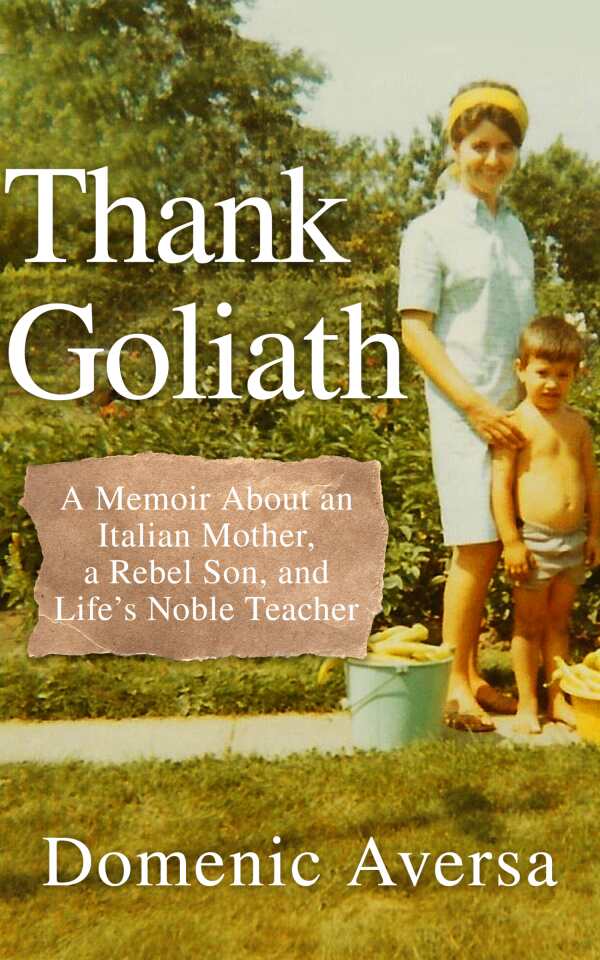Thank Goliath
A Memoir About an Italian Mother, a Rebel Son, and Life's Noble Teacher
Thank Goliath is the compelling memoir of a first-generation Canadian whose immigrant mother taught him lessons worth sharing.
Domenic Aversa’s memoir Thank Goliath is about how his firm Italian mother guided him through his troubled teenage years.
Aversa’s mother, Benedetta, was born in postwar rural Italy. Her family moved to the US when she was eleven. After she got married, she moved again to be near her husband’s family in Canada. Aversa and his sister were raised there as the family’s first Canadian-born generation.
But Aversa was labeled as a troublemaker when he was young. Benedetta, listening to her husband’s family’s advice to “Just hit him!”, responded with a firm hand and a wooden shoe. Under this influence, guilt and atonement become reoccurring themes in the book.
Under Benedetta’s guidance, Aversa was made to understand that he would face challenges in life, just as his immigrant parents had. Still, he achieved celebrated family firsts: he was accepted into law school and made a name for himself in business, law, and philanthropy. When Benedetta was older, he became her health advocate, helping her to navigate the Canadian health-care system.
The book’s memoir elements fold into moving celebrations of Benedetta herself, transforming the text into an homage—as much if not more about Benedetta than it is about Aversa. It shares stories about how she overcame massive challenges in her own life; these are made to parallel and inform Aversa’s own responses to struggles. Their twinned tales function as an accessible parable of personal success, with standout scenes showing the ways in which Aversa and Benedetta worked through and overcame their obstacles.
Each chapter tells a story from Aversa and Benedetta’s life; they’re flowed along a general timeline and form an effective whole. Their mother-son relationship is seen evolving as they age. Aversa’s thoughts on how his mother’s guilt had the potential to manifest itself as physical ailments are of interest later in the book; such musings are mirrored in his concerns that his own failings, including maintained grudges, might have their own physical consequences.
The storytelling assumes a casual cadence, pulling tales of personal triumph forward as it goes. And to further emphasize Aversa and Benedetta’s mother-son bond, the book includes memories of their phone calls and conversations, featuring frequent Italian-mother questions about whether Aversa ate, was hungry, or would become hungry later. Still, in addition to the book’s split focus between Aversa and Benedetta, it also deviates from its general themes at points to opine on subjects such as how the Canadian and US health-care systems differ. Nonetheless, these discursive moments are interesting in their own right, and they do derive from Aversa’s personal experiences as well.
Featuring themes of guilt, atonement, and perseverance in overcoming struggles, Thank Goliath is the compelling memoir of a first-generation Canadian whose immigrant mother taught him lessons worth sharing.
Reviewed by
Erin Nesbit
Disclosure: This article is not an endorsement, but a review. The publisher of this book provided free copies of the book and paid a small fee to have their book reviewed by a professional reviewer. Foreword Reviews and Clarion Reviews make no guarantee that the publisher will receive a positive review. Foreword Magazine, Inc. is disclosing this in accordance with the Federal Trade Commission’s 16 CFR, Part 255.

